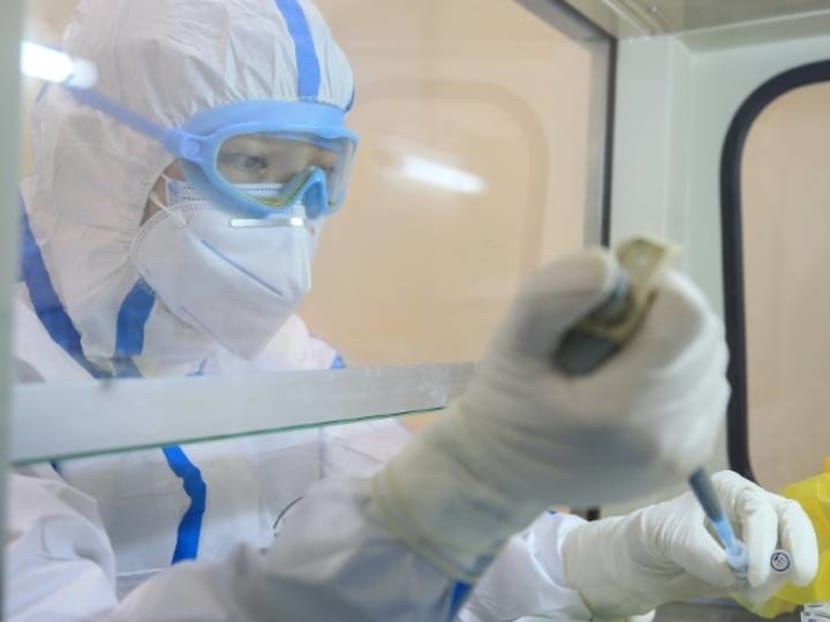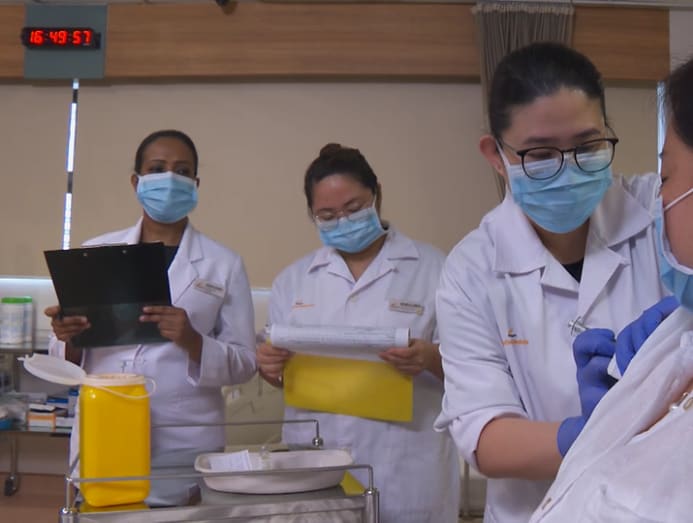Commentary: Why clinical trials in Singapore are a win-win for patients and the economy
Clinical trials conducted locally allow patients in Singapore early access to revolutionary therapies and help derive economic benefit from our billion-dollar research investments, says Dr Danny Soon.

File photo of a researcher in a laboratory. (File photo: AFP/STR)
SINGAPORE: May 20 marked International Clinical Trials Day, commemorating the landmark trial conducted by Scottish surgeon James Lind in 1747. How many of us in Singapore would have paid heed to clinical trials before the COVID-19 pandemic shook up our lives and society?
With the speedy development of ground-breaking COVID-19 vaccines, clinical trials have been thrust into the public consciousness. Although often obscure and sometimes viewed with scepticism, they are far from uncommon.
If you’ve ever received a prescription medicine, it has almost certainly undergone a clinical trial to determine its safety, effectiveness, dosage and possible side effects, before it sees the light of day in a pharmacy.
In Singapore, the Health Sciences Authority (HSA) approved 146 clinical trials in 2021. Right now, there are over 62,000 studies that are open and recruiting globally, according to the United States National Institutes of Health’s clinicaltrials.gov site, one of the most comprehensive registries for clinical trials and research.
Clinical trials are at the core of translation – converting results in innovative research into applications that benefit people. And Singapore is well-positioned to both support and benefit from local clinical trials.
EARLY ACCESS TO NOVEL THERAPIES FOR LOCAL POPULATION
In Singapore, liver cancer is in the top five most common cancers in men and the top four causes of cancer death in both men and women. It is of relatively higher prevalence in East and Southeast Asian populations. The five-year survival rate has been estimated to be as low as 35 per cent, even with early diagnosis and treatment.
One emerging treatment is cell therapy. In May, SCG Cell Therapy, a cell therapy company headquartered locally, had their clinical trial application approved to test a liver cancer immune cell therapy in a “first-in-man” study, when the investigational therapy is entered into human testing for the first time.
The local availability of complementary capabilities is also important to biotechnology companies. SCG’s therapy product is also manufactured locally at HSA’s Cell Therapy Facility, which has a track record of cell therapy product manufacture that fulfils international regulatory requirements for consistency and safety in trial use.
The ability to conduct clinical trials also meant that Singapore could rapidly trial novel vaccines and therapeutics early in the COVID-19 pandemic. Early studies for antiviral drug Remdesivir were conducted at the National Centre for Infectious Diseases, with the support of organisations like the Singapore Clinical Research Institute.
Clinicians were able to take an early look at the data, and local COVID-19 patients had early access to potentially life-saving treatment. The local trials also provided data used to get the Emergency Use Authorisation by the United States Food and Drug Administration (FDA).
Clinical trials for major public health issues of high relevance to Singapore can also inform local clinicians and health systems on the best strategies for prevention and treatment.
For instance, Singapore has one of the highest rates of myopia in the world, with an estimated 83 per cent of young adults with the condition. The Singapore National Eye Centre (SNEC) has been running studies on myopia for over a decade, with the current ATOM3 study examining the effect of low-dose atropine to slow down the progression of myopia in high-risk children.
ECONOMIC RETURNS FROM RESEARCH INVESTMENT
Local clinical trials also help Singapore derive economic value from the large investments we put in biomedical sciences.
It is on the back of high-quality research and demonstrated capability, such as the ATOM3 myopia study, that gives confidence to companies to invest in Singapore. Johnson and Johnson Vision established a S$36 million public-private partnership with the SNEC and Singapore Eye Research Institute for the study and prevention of myopia in 2018. This was followed in 2021 by a further investment to support innovation in and improve access to eye health services.

In 2000, Singapore launched the initiative to develop the biomedical sector as the fourth pillar of the economy. Under the Research, Innovation and Enterprise (RIE) 2025 Plan, the Government is investing S$25 billion into research and innovation over the next five years, including the expansion of the RIE 2020 health and biomedical sciences domain to include human health and potential and address a key national priority – a rapidly ageing population.
The talent and capability base built up over the last two decades is now driving a striking growth in local biomedical start-ups, drawing upon homegrown intellectual property and talent. In December 2021, Enterprise Singapore reported that local biomedical start-up companies raised S$820 million from January to September 2021, a new record.
If biotech companies are able to take novel products through to clinical proof-of-concept studies, which are clinical trials that demonstrate the effect of the therapy, their valuations may rise significantly as investors gain confidence in the underlying asset and technology, and pour in capital.
This in turn is used to fund hiring, infrastructure development and corporate services, and drive further developmental activities.
Local trials provide early access to novel and differentiated therapies, refine medical and prescription practices for the local population, and create intellectual property and jobs for Singaporeans through pharmaceutical companies setting up facilities here.
Singapore has thus come a long way in its aspirations as a biomedical hub.
WHAT NEXT FOR CLINICAL TRIALS?
One impediment to rapid drug development is the speed and cost of clinical trials. Clinical trials go through a series of phases, with the crucial Phase 3 trials typically requiring thousands of patients, many years to complete and hundreds of millions of dollars to run.
Related:
Patients traditionally have to attend personally at research sites, which may discourage trial participation and are costly to staff. But as technology and connectivity have improved over the years, and remote monitoring of clinical trial participants has become more feasible, the industry has been inching its way towards “decentralised” trials.
Certain parameters, such as blood pressure and sugar levels, may be taken by a patient at home, or patients may self-report adverse events or certain measures that serve as trial endpoints.
The progress on these approaches has been slow, due to the conservative nature of the industry. However, the COVID-19 pandemic, which severely curtailed visits to trial sites for trial participants, drove dramatic changes.
To protect participants’ safety and ensure the integrity of trial data, HSA issued a guidance for the conduct of clinical trials during COVID-19 and addressed issues such as remote patient monitoring, informed consent and delivery of investigational medicines. The European Medicines Authority and the US FDA took similar approaches.
Suddenly, practices that were perhaps previously taboo were embraced. Decentralised trials will probably be more appropriate for some trials than others, but it opens up exciting possibilities – widening the catchment of participants, speeding up recruitment, improving monitoring and trial data, and potentially lowering the cost of development.
Clinical trials are at the heart of modern medical therapies and practices. Many of our advances in the treatment of dreaded diseases would not exist if not for trials. We are possibly at the cusp of an exciting new era of clinical trials, and with it, the promise of better therapies, delivered faster.
Dr Danny Soon is the CEO of the Consortium for Clinical Research and Innovation, Singapore and Executive Director at the Singapore Clinical Research Institute.









